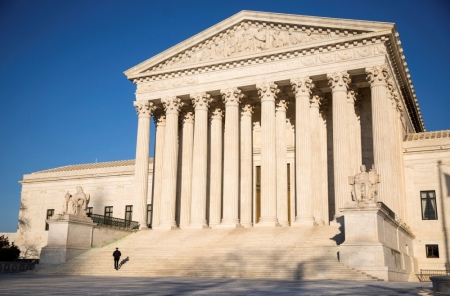Supreme Court Stops IRS Fines From Hitting Catholic Group Over Federal Contraception Mandate

The U.S. Supreme Court has thrown out a ruling against a Catholic organization that was being compelled to provide insurance coverage for contraceptives at the threat of being fined by the Internal Revenue Service.
On Monday the highest court in the nation granted the Michigan Catholic Conference their request for an exemption for religious reasons against the Health and Human Services contraception mandate.
In the Supreme Court's order, the Justices invoked last year's landmark Hobby Lobby decision, which concluded that "closely-held businesses" could be exempted from the HHS mandate due to religious objections.
"The petition for a writ of certiorari is granted. The judgment is vacated, and the case is remanded to the United States Court of Appeals for the Sixth Circuit for further consideration in light of Burwell v. Hobby Lobby Stores, Inc.," read the order.
The Washington, DC-based Becket Fund for Religious Liberty has followed the case and submitted an amicus brief on behalf of the Catholic Conference.
Mark Rienzi, senior counsel with the Becket Fund, told The Christian Post he was "delighted that the Court once again rejected the government's stingy view of religious liberty."
"That's what is so bizarre about the government's position," said Rienzi regarding the federal government's effort to prevent a religious organization from getting a religious exemption.
"The government says they are not a 'religious employer' and therefore they have to sign forms to authorize and require other people to give out contraceptives for them. That makes no sense at all."
In 2012, the Obama Administration announced the creation of an HHS mandate that would compel insurance to cover FDA approved birth control methods.
The announcement garnered controversy as many argued that the then-proposed HHS mandate did not adequately exempt all of those with religious objections to some or all forms of contraception covered by the mandate.
Since then, the federal government has made various compromises and has lost the occasional court case compelling them to amend the mandate.
"Under current law, [the Catholic Conference and others] can receive an exemption by writing a letter to the Health and Human Services Department or filling out a two-page form to document their objections," reported the Hill.
"But the groups said those extra steps created an 'unjustified substantial burden' and called for the same kind of across-the-board exemption that houses of worship received under the law. "
Regarding the overall lawsuits being leveled nationwide against the mandate, Rienzi of Becket Fund told CP that he believed the Supreme Court will eventually have to take up the issue.
"I think that the Court will continue the path it has set in the long string of mandate cases to date … and it will protect religious ministries from this mandate," said Rienzi.
"This whole fight is unnecessary and silly. Obviously the government can distribute contraceptives without the forced involvement of the Catholic Church and its ministries. The government can put a man on the moon — they can distribute pills without religious ministries."
Reportedly Michigan Catholic Conference's success at the high court is the sixth group since December 2013 that the Justices have sided with on HHS mandate legal action.
The other five are Little Sisters of the Poor, Hobby Lobby Stores, Wheaton College, the University of Notre Dame, and Archbishop David A. Zubik with the Diocese of Pittsburgh.





















